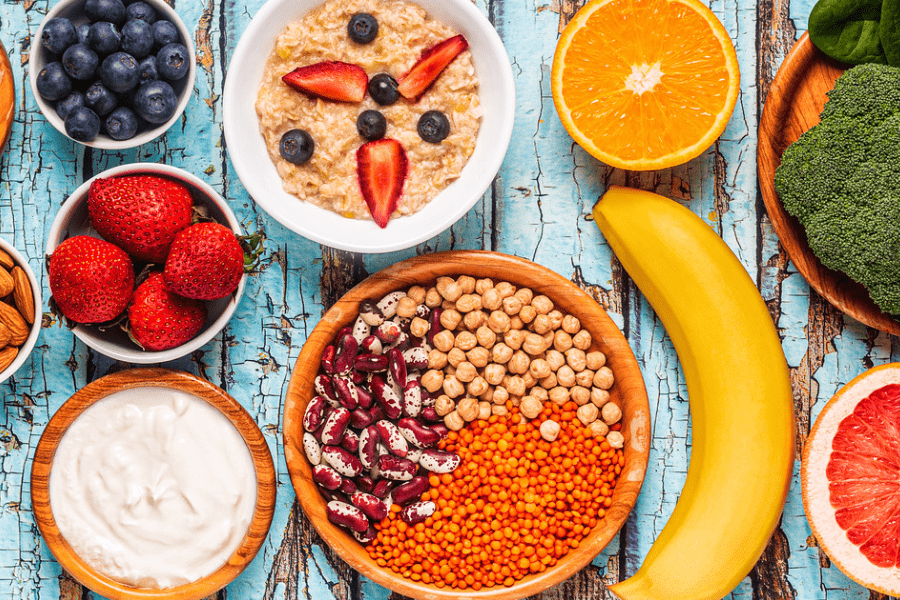Our general well-being and quality of life depend heavily on our mental health. It has an impact on how we think, feel, and act in daily life and has an effect on our capacity to manage stress, form relationships, and accomplish our objectives.
A variety of problems, including anxiety, despair, addiction, and suicide, can be brought on by poor mental health. Living a happy and fulfilled life depends on taking care of our mental health.
Our mood and mental health can be significantly impacted by the food we eat. While some foods may improve cognitive function and uplift the mood, others may have the opposite impact. Salmon and walnuts are two foods high in omega-3 fatty acids that can help lessen anxiety and depressive symptoms. Antioxidants found in berries and dark leafy greens help shield the brain from harm and enhance cognitive performance.
On the other hand, an increased risk of depression and other mental health problems has been associated with heavy consumption of processed foods and sugary beverages. The foods we choose to eat can have a good effect on our general well-being if we make informed decisions about them.
The link between food and mental health. Fruits, vegetables, whole grains, and lean meats are nutrient-dense foods that can enhance brain health and lower the risk of mental illness. On the other hand, a diet rich in processed foods, sweets, and bad fats has been linked to a higher chance of developing depression and anxiety.
Mental health diet plan. Foods that enhance brain function and advance mental health are included in a diet plan for mental health. Fruits and vegetables that are high in nutrients, lean proteins, whole grains, and healthy fats like those in nuts and seeds may all fall under this category.
Limiting or avoiding sweets, bad fats, and processed foods can also be good for mental health. A certified dietician or mental health specialist can be consulted to help develop a personalized strategy.
Stress and Depression
Two of the most prevalent mental health conditions impacting people globally are stress and depression. Although stress is a normal reaction to difficult circumstances, ongoing stress can also hasten the onset of depression. Felling stressed is most common expression of other people when their energy level is low and because of this they don’t know how to improve mental health
Both illnesses can affect one’s mood, ability to sleep, level of energy, and overall quality of life. In order to effectively manage stress and sadness, it can be helpful to seek professional mental health assistance.
Foods that help you be healthy
A diversified, well-balanced diet is essential for general health and wellbeing. Nutrient-rich fruits and vegetables, whole grains, healthy other meats, and healthy fats are some foods that can improve your health. These meals can supply important vitamins, minerals, and other elements that support biological processes, enhance digestion, strengthen the immune system, and lower the risk of chronic illnesses. Mental health eating is very important to treat mental illness because of your eating habits.
A Healthy Gut
Gut health, in order to be healthy and happy generally, one must have a good stomach. Trillions of bacteria that are found in the stomach are essential for digestion, immunological response, and mental wellness.
Consuming a well-balanced diet full of fiber, prebiotics, and probiotics can help maintain a healthy gut microbiota, which can lower inflammation, enhance digestion, and boost mental wellbeing. A healthy gut can also be facilitated by regular exercise, stress reduction, and sound sleeping habits and it will help you to not feel tired.
Warm, Soothing Foods
Foods that are warm and cozy may be beneficial for the body as well as the mind. Soups, stews, oats, and herbal teas are a few examples of these culinary items. They frequently offer important nutrients, are frequently simple to digest, and can support sensations of warmth and relaxation. Warming spices like cinnamon, ginger, and turmeric can also offer other health advantages.
Dark Chocolate
When taken in moderation, dark chocolate can offer a number of health advantages. Antioxidants found in abundance in it can help shield the body from harm wrought by free radicals.
By lowering blood pressure and boosting blood flow, it can also benefit heart health. Because it contains phenylethylamine, a substance that can trigger the release of endorphins, dark chocolate may also have mood-enhancing properties.
3 foods to avoid for mental health

Certain foods should be restricted or avoided because they may have a harmful effect on mental health. The following are three foods to avoid for mental health:
1. Foods that have been processed
These foods frequently include a lot of sugar, bad fats, and additives that can cause inflammation and impair brain function.
2. Alcohol
While excessive alcohol intake can make stress and anxiety symptoms worse and has been linked to the onset of depression, it may also temporarily relieve these symptoms.
3. Caffeine
While consuming too much of it can cause anxiety, nervousness, and interrupted sleep cycles, it can also temporarily increase energy and alertness.
These foods can be restricted or avoided for the sake of mental health. As an alternative, emphasizing full, nutrient-dense diets can support ideal brain health and advance mental wellbeing.
Fatty Fish
Fatty fish such as salmon, tuna, and sardines are rich in omega-3 fatty acids, which are essential for brain function and mental health. These fatty acids can reduce inflammation, improve mood, and support cognitive function. Consuming fatty fish regularly as part of a balanced diet can promote overall health and well-being.
Mindful Eating
The practice of mindful eating entails being completely present when eating and paying attention to the situation. It might entail paying attention to hunger signals, appreciating the tastes and textures of food, and eating mindfully and slowly. Using mindful eating techniques can enhance digestion, lessen overeating, and foster a better connection with food. Additionally, it can aid in stress reduction and mental health promotion.
Can mental health disorders be reversed with diet?
Even though nutrition alone may not be able to cure all mental health issues, it may greatly help with symptom management and mental wellness in general. Inflammation can be reduced and brain function can be supported by a balanced diet full of nutrient-dense foods including fruits, vegetables, whole grains, and other meats.
A specialized strategy for controlling mental health symptoms via dietary and lifestyle modifications can be developed with the assistance of a mental health practitioner and a qualified dietitian.
Dark, Leafy Greens
Optimal brain function and mental health are supported by a diet high in the vitamins, minerals, and antioxidants found in dark, leafy greens like kale, spinach, and Swiss chard. These nutrients have anti-inflammatory, mood-lifting, and cognitive-improving properties. A balanced diet that includes dark, leafy greens can promote general health and wellbeing.
How Your Diet Can Affect Stress Levels, for Better or Worse
For better or worse, diet may have a big influence on stress levels. Consuming a well-balanced diet full of nutrient-dense foods might help people become more resilient to stress and lessen the harmful effects stress has on the body.
On the other hand, consuming plenty of sweets, processed foods, and bad fats can aggravate the effects of stress and lead to inflammation. Stress-relieving foods including leafy greens, berries, nuts, and seeds can help manage stress and improve general mental and physical health when they are included in a balanced diet.
Does fasting help mental health?
While some studies points to intermittent fasting’s potential advantages for mental health, including a reduction in inflammation and an improvement in brain function, it might not be suitable for everyone.
Fasting should be used cautiously since it might make some mental health disorders worse. Before beginning any new diet or fasting routine, it’s crucial to speak with a healthcare expert.
Medications for mental health
Medication-based therapies for mental health conditions can be successful when paired with counseling and lifestyle changes. Different medications alter brain chemicals and neurotransmitters to alleviate the symptoms of depression, anxiety, and other mental health conditions. It’s essential to thoroughly speak with a mental health professional and a healthcare practitioner to determine the proper medicine and dose for each person’s needs.
In conclusion, maintaining good mental health requires a holistic approach that includes a healthy diet and lifestyle. The food we eat affects our brain function and energy levels, which in turn affects our mood and overall mental well-being.
Eating well-balanced meals, including traditional diets that incorporate fresh fruits and vegetables, can provide the nutrients necessary for a growing body and support brain and nervous system health.
On the other hand, eating disorders and consuming unhealthy foods can negatively impact mental health and lead to feelings of stress, anxiety, and fatigue. By making mindful choices about what we eat and incorporating good food habits into our daily lives, we can improve our energy levels, support our mental health, and reduce the risk of developing mental illness.
Also, studies suggest that food choices play a key role in managing stress levels and maintaining optimal energy levels. Certain foods, such as those high in sugar and processed carbohydrates, can exacerbate stress and anxiety symptoms, while other foods, such as those rich in omega-3 fatty acids, can promote mental well-being. By being mindful of our food choices and incorporating stress-reducing foods into our diet, we can support our energy levels and reduce the negative impact of stress on our mental health.





